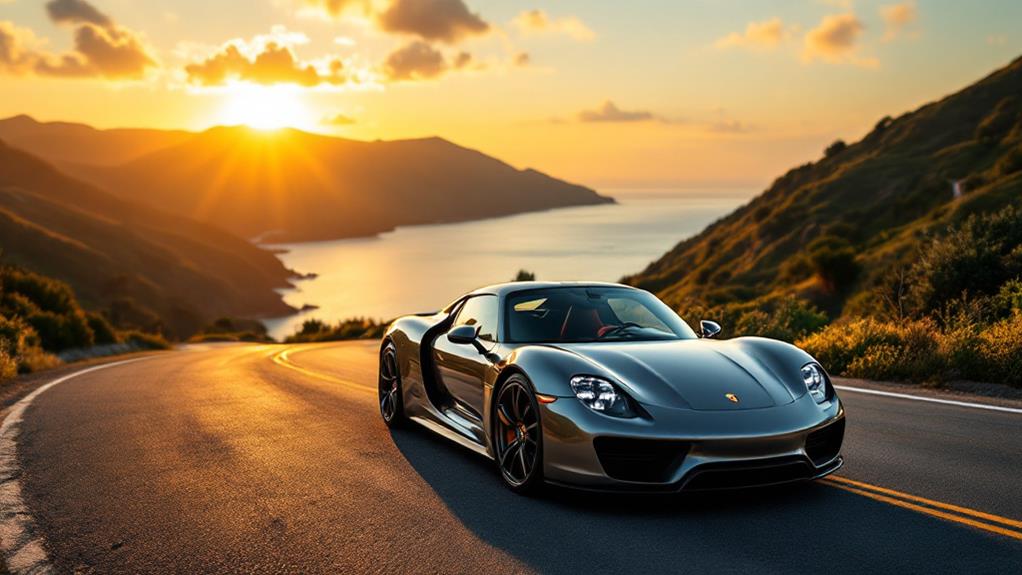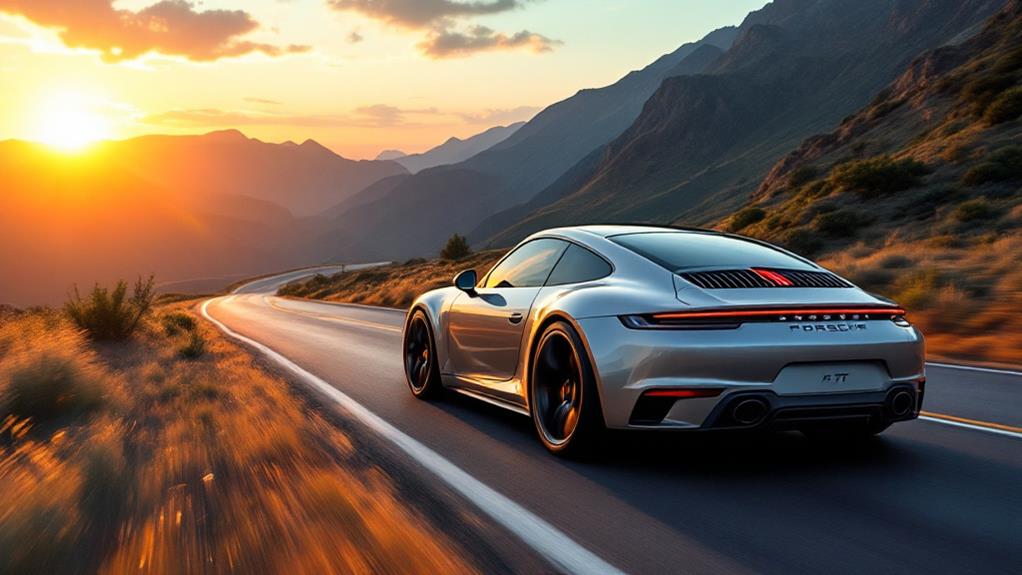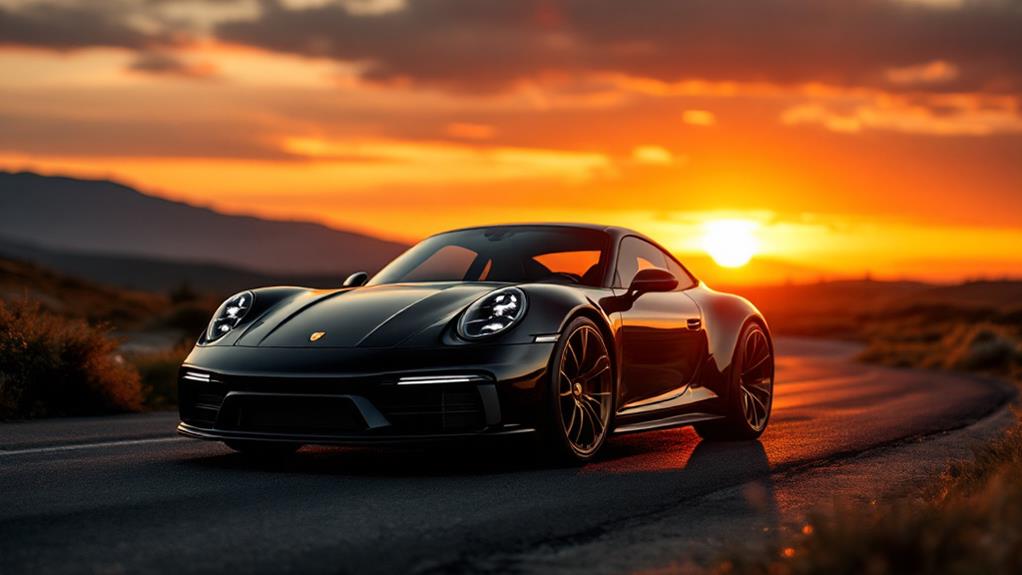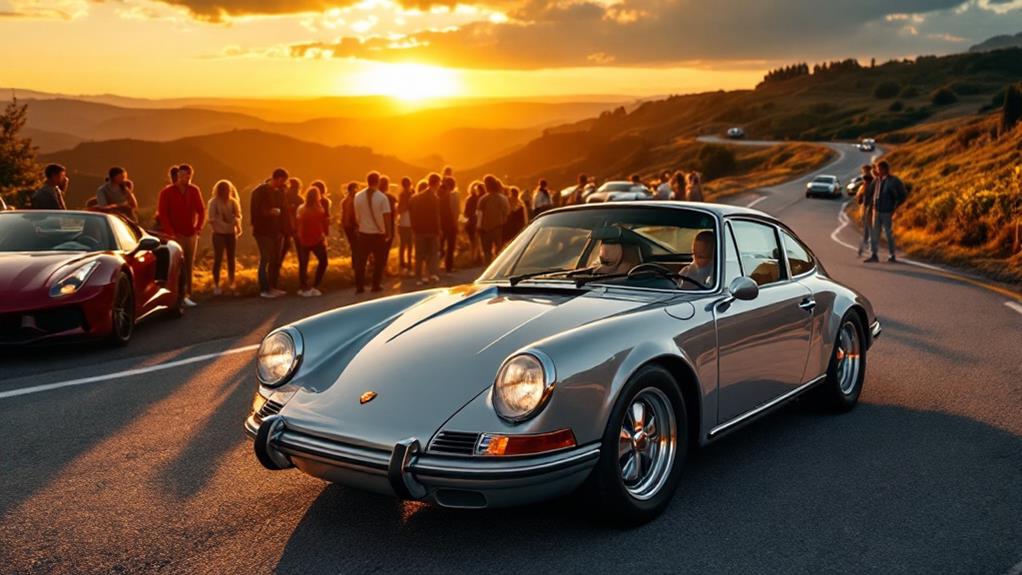Luxury Car Brand: The Rich Legacy of Porsche

You're stepping into a rich legacy of luxury and performance with Porsche, a brand synonymous with excellence since 1931. Founded by automotive visionaries Ferdinand Porsche and others, it began as an engineering consultancy in Stuttgart, Germany. The launch of the Porsche 356 in 1948 marked its entry into the luxury car market. Celebrated models like the Porsche 911 and 917 showcase a blend of innovation and iconic design. Porsche's commitment to motorsport, with over 30 Le Mans wins, further cements its status. With the cutting-edge Taycan and a lively community, Porsche continues its expedition of dreams and innovation. There's more to uncover on this expedition.
Origins and Founders
The legacy of Porsche began on April 25, 1931, when Ferdinand Porsche, along with partners Adolf Rosenberger and Anton Piëch, founded the company initially as an engineering consultancy. Located at Kronenstraße 24 in Stuttgart, Germany, this consultancy laid the foundation for a brand synonymous with high-performance vehicles and automotive excellence. Ferdinand Porsche's early work with Austro-Daimler demonstrated his prowess in automotive design and engineering, setting the stage for future innovations.
In 1948, the Porsche 356, the company's initial production car, hit the roads, marking a significant moment in the luxury automobile market. This model quickly established Porsche's reputation for crafting high-performance vehicles, embodying the brand's commitment to precision and excellence. The rich history of Porsche is closely tied to the contributions of Ferdinand's son, Ferry Porsche. He played an essential role in steering the brand toward success, ensuring the family legacy continued to thrive.
Porsche's progression from an engineering consultancy to a prestigious name in the automotive industry illustrates a commitment to quality and innovation. By understanding these origins, you appreciate how Porsche has maintained its status as a leader in automotive design and luxury.
Iconic Models
Imagine the thrill of driving a car that's not just a vehicle but a symbol of engineering mastery and design brilliance. Porsche's lineup of iconic models epitomizes luxury and high-performance, each telling a unique story in automotive history. It all began in 1948 with the Porsche 356, the brand's initial production car. Its sleek design and nimble handling set the stage for Porsche's reputation in the luxury car market.
Then came the Porsche 911 in 1963, an enduring icon with its distinctive silhouette. This model has continuously evolved, enhancing its performance capabilities while maintaining its classic appeal. The Porsche 917, launched in 1969, cemented its place in motorsport history with victories in endurance racing, particularly the prestigious Le Mans 24 Hours.
The Porsche Cayenne, introduced in 2002, marked a bold move into the SUV market, successfully blending luxury with sports car performance. Finally, the Porsche Taycan, released in 2019, represents the brand's commitment to innovation as their initial all-electric sports car. Each model reflects Porsche's relentless pursuit of excellence, shaping the future while honoring its rich legacy.
Engineering Milestones

Porsche's expedition through iconic models not only showcases luxury and performance but also highlights remarkable engineering milestones that have defined the brand. The adventure began with the Porsche 356 in 1948, setting the stage for engineering excellence with its high-performance capabilities and sleek design. This model laid the foundation for what would become a legacy of innovation in luxury cars.
The evolution of Porsche saw a major leap with the 911 in 1963. Its continuous refinements have maintained its iconic silhouette and performance, proving Porsche's commitment to engineering excellence. Then, in 1969, the Porsche 917 emerged, employing cutting-edge technology that made a lasting impression with its endurance race successes, including multiple Le Mans victories.
In the mid-1980s, the Porsche 959 broke new ground with advanced all-wheel-drive technology, setting new benchmarks for performance and innovation in iconic sports cars. Moving into the late 1990s, the shift to water-cooled engines, exemplified by the 911 model 996 in 1998, marked a significant engineering milestone. This alteration improved both performance and reliability, underscoring Porsche's dedication to innovation and the progression of Porsche's engineering prowess. Each milestone cements Porsche's legacy in automotive history.
Motorsport Achievements
Celebrating a legacy of speed and innovation, Porsche's achievements in motorsport are unmatched. With over 30 total wins at the 24 Hours of Le Mans, Porsche stands as the most successful manufacturer in the race's storied history. This remarkable record highlights the brand's enduring commitment to endurance racing. The legendary Porsche 917, introduced in 1969, cemented its place in motorsport heritage with a stunning 1-2 finish at Le Mans in 1970, showcasing Porsche's engineering innovations.
Porsche's motorsport prowess isn't limited to one iconic model. The 911, a symbol of performance and reliability, has achieved significant success across different racing series, including the American Le Mans Series and the iconic Targa Florio, where it first claimed victory in 1956. The 911 Carrera 4, with its all-wheel-drive innovation, exemplifies Porsche's dedication to enhancing handling and performance on the track.
The RS Spyder further demonstrates Porsche's motorsport excellence, winning multiple championships in the American Le Mans Series starting in 2005. These achievements reflect Porsche's unwavering determination to push the boundaries of racing technology, solidifying its status as a leader in the world of motorsports.
Brand Philosophy

While Porsche's triumphs on the racetrack are legendary, it's the underlying brand philosophy that truly fuels these accomplishments. The Porsche brand is driven by a commitment to excellence that transforms mere dreams into reality. This philosophy is encapsulated in the principle of "Making visions a reality," allowing the brand to create luxury automotive masterpieces that offer an unparalleled driving experience. It's a legacy established by founder Ferry Porsche, who envisioned high-performance sports cars that seamlessly blend passion and innovation.
At the heart of Porsche's philosophy is a community of dreamers—enthusiasts who share a love for designs and performance. Stories of individuals like Gilberte Thirion and Krithin Paul Pereira embody this spirit, showing that the brand's reach extends beyond just cars. Through platforms like the Christophorus magazine, Porsche not only shares its rich history but also invites you to be part of its future. They encourage you to share your dreams and feedback, ensuring the brand's legacy continues to thrive.
Ultimately, Porsche's philosophy isn't just about cars; it's about embracing a lifestyle that values dreams, innovation, and a relentless pursuit of excellence in every aspect of the driving experience.
Modern Innovations
Embracing the future of automotive technology, Porsche has boldly stepped into the domain of modern advancements. By introducing the Taycan in 2019, Porsche set a new benchmark in the electric vehicle segment. This all-electric sports car combines breathtaking performance with luxury, showcasing Porsche's commitment to electrification and sustainability. You can feel the thrill and precision of driving dynamics that only groundbreaking engineering can deliver.
Porsche's dedication to modern technology is evident in its hybrid models like the Cayenne and Panamera. They seamlessly blend hybrid technology with high-end luxury and performance, offering you sustainable options without compromising on driving pleasure. With advanced safety features and lightweight materials, these vehicles guarantee you experience unrivaled driving dynamics.
Imagine the power of the 911 GT3 RS, launched in 2022, with its:
- Advanced aerodynamics that slice through the air with precision.
- 4.0-liter flat-six engine delivering a staggering 518 horsepower.
- Sophisticated all-wheel-drive systems enhancing stability and safety.
Porsche aims to achieve a 50% share of electric vehicles in its sales by 2025, underscoring its commitment to sustainability. This ambitious goal reflects Porsche's forward-thinking approach, assuring it remains at the forefront of luxury automotive advancement.
Community of Dreamers

Porsche doesn't just build cars; it fosters a community where dreams are shared and celebrated. Through platforms like Christophorus magazine, Porsche shares inspiring narratives from its fans, showcasing how each individual's dream intertwines with the brand's odyssey. This engagement not only strengthens the connection among enthusiasts but also celebrates the brand's rich history and future progress.
Anniversary Celebrations
As you engage yourself in the lively community of dreamers that Porsche has nurtured, you find yourself at the heart of a milestone celebration. In 2023, Porsche marks 75 years of sports car heritage, celebrating the iconic legacy that began with the Porsche 356 No. 1 Roadster in 1948. This anniversary isn't just about history; it's a living exhibition of commitment and innovation.
The "Driven by Dreams" exhibition at the DRIVE Volkswagen Group Forum in Berlin captures this spirit perfectly. Here, you'll witness:
- Innovative vehicles: Marvel at the latest models that continue the driving legacy.
- Historical exhibits: Relive moments that shaped Porsche's iconic history.
- Personal stories: Uncover the dreamers behind the wheel who contributed to Porsche's success.
Celebrations extend beyond Berlin. The Porsche Museum in Zuffenhausen hosts events in June 2023, honoring decades of evolution. Globally, prestigious venues like the Petersen Automotive Museum in Los Angeles and the Shanghai Auto Museum join in, connecting Porsche's rich history with its visionary future. These anniversary celebrations emphasize a shared commitment to driving innovation and community, ensuring the legacy of Porsche lives on.




